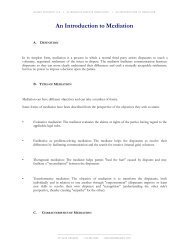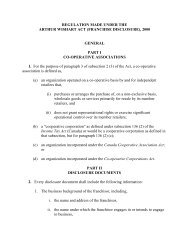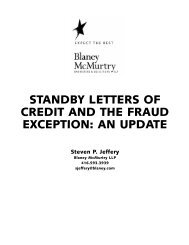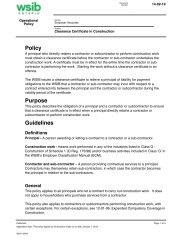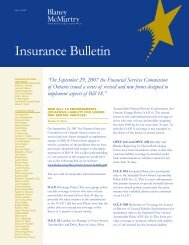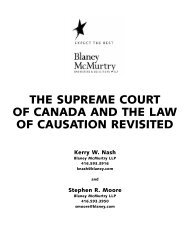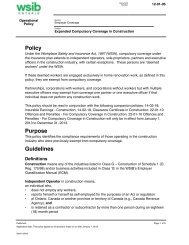A Canadian Roadmap - Blaney McMurtry LLP
A Canadian Roadmap - Blaney McMurtry LLP
A Canadian Roadmap - Blaney McMurtry LLP
Create successful ePaper yourself
Turn your PDF publications into a flip-book with our unique Google optimized e-Paper software.
<strong>Blaney</strong> <strong>McMurtry</strong> <strong>LLP</strong><br />
Breach of Notice Condition & Relief from Forfeiture: Canada<br />
14<br />
In <strong>Canadian</strong> Newspapers Co v Kansa General Insurance Co, there<br />
was an arrangement between the insured and insurer whereby the<br />
insured newspaper publisher would conduct the defence of libel<br />
actions brought against it, but provide the liability insurer with<br />
material information regarding significant developments. 19 Contrary<br />
to the arrangement, the insured failed to report information<br />
concerning an offer to settle, the development of the claimant’s<br />
position regarding malice and lack of good faith and increased legal<br />
fees for an anticipated lengthy trial. These developments were held<br />
to all significantly affect the risk to the insurer.<br />
The insured was found to have substantially breached the duty of<br />
co-operation. The Court of Appeal referred to authority for the<br />
proposition that breach of the duty to co-operate, if substantial, is<br />
breach of a condition precedent to recovery. The Court of Appeal<br />
went on to conclude: “[t]his breach [by the insured newspaper<br />
publisher] is more than mere “imperfect compliance”, it is a<br />
substantial breach of the policy and on this basis alone [the insured]<br />
is not entitled to claim relief from forfeiture”. 20<br />
Failure to give notice of a claim within the time prescribed under an<br />
insurance contract has been accepted by the Supreme Court of<br />
Canada to constitute imperfect compliance for which the court has<br />
power to grant relief from forfeiture. 21 In Falk Bros., the Supreme<br />
Court of Canada explained:<br />
… The distinction between imperfect compliance and noncompliance<br />
is akin to the distinction between breach of a term of<br />
the contract and breach of a condition precedent. If the breach is<br />
of a condition, that is, it amounts to non-compliance, no relief<br />
under s. 109 is available.<br />
The case law has generally treated failure to give notice of claim<br />
in a timely fashion as imperfect compliance whereas failure to<br />
institute an action within the prescribed time period has been<br />
viewed as non-compliance, or breach of a condition precedent.<br />
Thus, courts have generally been willing to consider granting<br />
relief from forfeiture where notice of claim has been delayed:<br />
<strong>Canadian</strong> Equipment Sales & Service Co. v. Continental Insurance<br />
Co., supra; Minto Construction Ltd. v. Gerling Global General<br />
Insurance Co., supra; Moxness v. Saskatchewan Government<br />
Insurance Office, [1977] 3 W.W.R. 393 (Sask. D.C.); J[u]net<br />
Estate and Kallos v. Saskatchewan Government Insurance, supra;<br />
North Lethbridge Garage Ltd. v. Continental Casualty Co., [1930]<br />
1 W.W.R. 491 (Alta. S.C., App. Div.). See also: Dashchuk Lumber<br />
Ltd. v. Proman Projects Ltd., supra.<br />
On the other hand, cases in which failure to meet a time<br />
requirement has been held to be non-compliance rather than<br />
imperfect compliance have largely been cases in which the time<br />
period was for the commencement of an action rather than for the<br />
giving of notice: D.S. Ashe Trucking Ltd. v. Dominion Insurance<br />
Corp. (1966), 55 W.W.R. 321 (B.C.C.A.); National Juice Co. v.<br />
Dominion Insurance Co. (1977), 18 O.R. (2d) 10 (Ont. C.A.).<br />
An interesting question which arises is whether failure of an insured<br />
to provide any notice at all of a claim, as opposed to late notice,<br />
constitutes non-compliance such that the court has no power under<br />
the applicable statutory provision to grant relief from forfeiture.<br />
The lower court decision in Walker, although technically obiter,<br />
suggests that it does not. 22<br />
As previously discussed, the court in Walker found notice provided<br />
by a co-defendant to the insurer to be effective under the policy<br />
provisions. The court went on to consider the insured’s entitlement<br />
to relief from forfeiture in the event it was incorrect. Sovereign<br />
argued that there is no entitlement to relief from forfeiture under<br />
section 129 of the Insurance Act in the complete absence of<br />
compliance with the policy condition. In other words, Sovereign<br />
argued that relief from forfeiture is not available where the insured<br />
fails to provide any notice at all. The Superior Court of Justice<br />
disagreed. It quoted at length from Falk Bros., holding that such<br />
breach constitutes imperfect compliance only in respect of which<br />
relief from forfeiture is available. 23 The court reasoned that, at its<br />
worst, the insured failed to provide notice in a timely manner. This<br />
was contrasted with failure to bring an action within a stipulated<br />
time which is non-compliance in respect of which relief from<br />
forfeiture is not available.<br />
Sovereign argued, in the alternative, that there was substantial<br />
breach of a condition as in <strong>Canadian</strong> Newspapers entitling the<br />
insurer to deny coverage. The Superior Court of Justice rejected<br />
this argument as well. There was found to be no evidence of noncooperation<br />
by the insured. On the contrary, there was no<br />
documentation suggesting that Sovereign ever attempted to contact<br />
the insured’s principal even after receiving notice of the claim from<br />
the co-defendant. In circumstances where the insurer has notice of<br />
an action but decides not to take steps to defend it, the insurer<br />
cannot complain there was a lack of co-operation by the insured.<br />
The appellate court decision in Walker did not decide the issue. It<br />
held the case to be one of imperfect compliance as opposed to noncompliance<br />
on the facts. It reasoned that the case was not one<br />
where the insurer had no notice. The insurer had actual notice even<br />
if it was received from the crossclaiming co-defendant as opposed<br />
to from the insured. Again, the purpose of the notice condition was<br />
emphasised. The insurer had an opportunity to investigate,<br />
negotiate settlement and/or defend but chose not to do so.<br />
The question of whether no notice, as opposed to late notice,<br />
constitutes non-compliance, while interesting, is likely academic.<br />
Presumably, the insured could simply provide notice and forward<br />
on the pleadings at any time which would change the factual<br />
circumstances from one of no notice to one of late notice. The<br />
equitable remedy of relief from forfeiture would then be available.<br />
The Test for Relief from Forfeiture<br />
The test applied by the courts in determining whether to grant relief<br />
from forfeiture on a particular set of facts is well-established. There<br />
are two components. The first inquiry is whether the insurer has<br />
been prejudiced. The second relates to the conduct of the insured.<br />
The test has been outlined in a number of cases:<br />
I have reviewed dozens of cases and it has become clear that<br />
recourse to s. 103, and its counterpart in other jurisdictions with<br />
relation to other kinds of insurance, has always depended on the<br />
particular facts of the case, and on whether there was clearly some<br />
actual proven prejudice to the insurer, or potential prejudice which<br />
could not be quantified after the event. In addition, regard was had<br />
to the conduct of the insured, whether he had, for example,<br />
deliberately misled or lied to the insurer. There is no suggestion in<br />
this case that the plaintiff has been guilty of bad faith, or deliberate<br />
misrepresentation or concealment. 24<br />
Conduct is important in deciding whether to grant relief against<br />
forfeiture because insurance contracts are contracts of good faith<br />
and because the remedy is an equitable one. It is trite law that<br />
conduct amounting to a breach of good faith by an insured will<br />
disentitle the insured to relief against forfeiture...<br />
…<br />
Mackinnon J. A., speaking for the court in <strong>Canadian</strong> Equipment<br />
Sales & Service Co. v. Continental Insurance Co. (1975), 9 O.R.<br />
(2d) 7 at p. 16, 59 D.L.R. (3d) 333, stated:<br />
Section 103 is an ameliorating clause. It is not to be used to allow<br />
contracts entered into in good faith to be broken with a careless<br />
disregard for the rights of the insurer so as to cause actual or<br />
potential injury to the insurer’s position. 25<br />
... In the absence of bad faith, or a deliberate misrepresentation,<br />
relief should be granted where no prejudice has occurred … 26<br />
WWW.ICLG.CO.UK<br />
ICLG TO: INSURANCE & REINSURANCE 2013<br />
© Published and reproduced with kind permission by Global Legal Group Ltd, London



